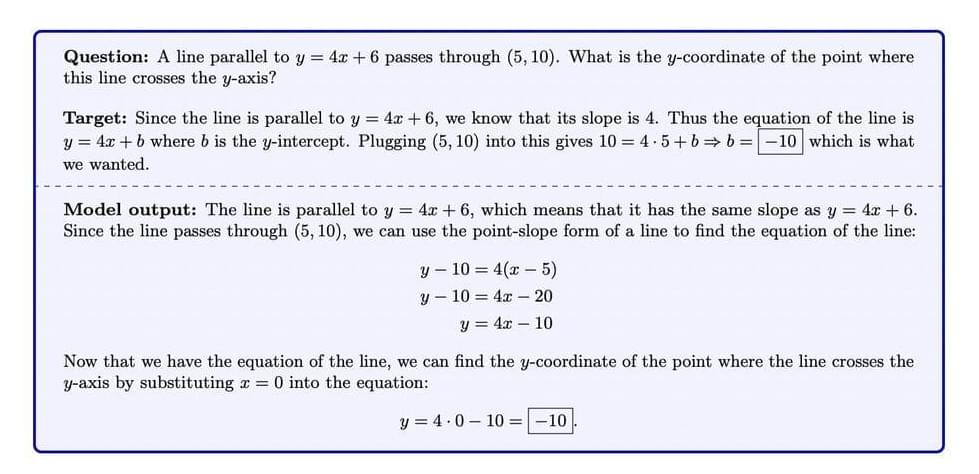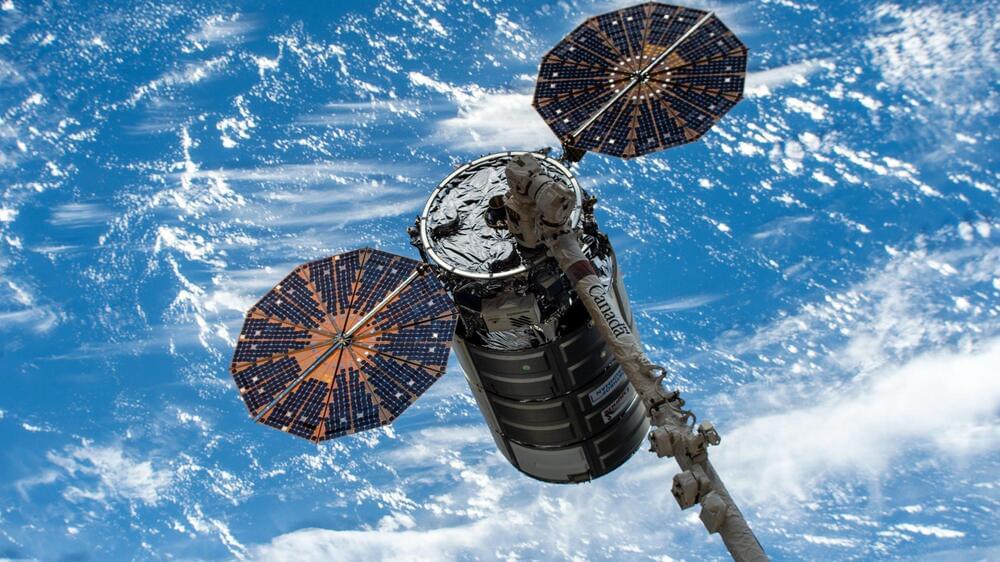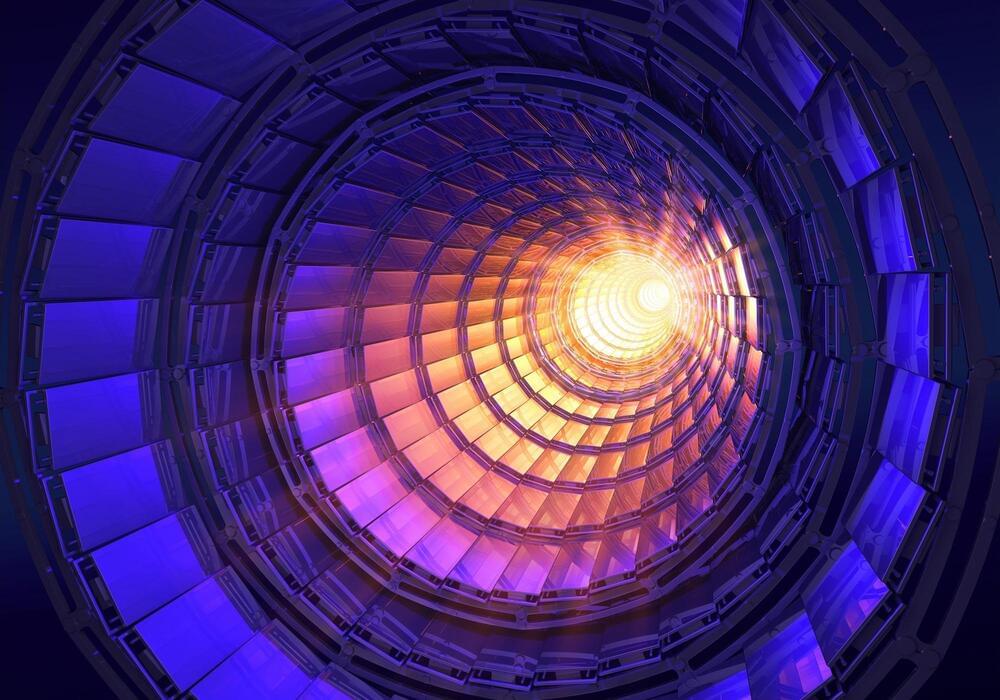Physicists find that causal loops, where two events separated in time influence each other in paradoxical ways, are allowed in many theoretical universes, some of which share features with our own.



Large language models are widely adopted in a range of natural language tasks, such as question-answering, common sense reasoning, and summarization. These models, however, have had difficulty with tasks requiring quantitative reasoning, such as resolving issues in mathematics, physics, and engineering.
Researchers find quantitative reasoning an intriguing application for language models as they put language models to the test in various ways. The ability to accurately parse a query with normal language and mathematical notation, remember pertinent formulas and constants and produce step-by-step answers requiring numerical computations and symbolic manipulation are necessary for solving mathematical and scientific problems. Therefore, scientists have believed that machine learning models will require significant improvements in model architecture and training methods to solve such reasoning problems.
A new Google research introduces Minerva, a language model that uses sequential reasoning to answer mathematical and scientific problems. Minerva resolves such problems by providing solutions incorporating numerical computations and symbolic manipulation.

On Tuesday, July 5, space physics and human studies dominated the science agenda aboard the International Space Station. The Expedition 67 crew also reconfigured a US airlock and put a new 3D printer through its paces.
The lack of gravity in space impacts a wide range of physics revealing new phenomena that researchers are studying to improve life for humans on and off the Earth. One such project uses artificial intelligence to adapt complicated glass manufacturing processes in microgravity with the goal of benefitting numerous Earth-and space-based industries. On Tuesday afternoon, NASA
Established in 1958, the National Aeronautics and Space Administration (NASA) is an independent agency of the United States Federal Government that succeeded the National Advisory Committee for Aeronautics (NACA). It is responsible for the civilian space program, as well as aeronautics and aerospace research. Its vision is “To discover and expand knowledge for the benefit of humanity.” Its core values are “safety, integrity, teamwork, excellence, and inclusion.”

The Large Hadron Collider detectors started recording high-energy collisions at the unprecedented energy of 13.6 TeV.
The Large Hadron Collider is once again delivering proton collisions to experiments, this time at an unprecedented energy of 13.6 TeV, marking the start of the accelerator’s third run of data taking for physics.
A burst of applause erupted in the CERN.

A lot of heat gets lost during the conversion of energy. Estimates even put it at more than 70%. However, in thermoelectric materials, such as those being studied at the Institute of Solid State Physics at TU Wien, heat can be converted directly into electrical energy. This effect (the Seebeck effect) can be used in numerous applications in industry but also in everyday life.
Recently, Ernst Bauer’s research team made an exciting discovery in a thermoelectric material consisting of iron, vanadium and aluminum (Fe2VAl). The researchers recently published their results in Nature Communications.
A unique ultra-faint dwarf galaxy has been discovered on the outer fringes of the Andromeda Galaxy thanks to the discerning eyes of an amateur astronomer examining archival data processed by NSF’s NOIRLab’s Community Science and Data Center. The dwarf galaxy — Pegasus V — was revealed to contain very few heavier elements and is likely to be a fossil of the first galaxies in follow-up observations by professional astronomers using the International Gemini Observatory, a Program of NSF’s NOIRLab.
An unusual ultra-faint dwarf galaxy has been discovered on the edge of the Andromeda Galaxy with the help of several facilities of NSF’s NOIRLab. Called Pegasus V, the galaxy was first detected as part of a systematic search for Andromeda dwarfs coordinated by David Martinez-Delgado from the Instituto de Astrofísica de Andalucía, Spain, when amateur astronomer Giuseppe Donatiello discovered a curious ‘smudge’ in data in a DESI
The Dark Energy Spectroscopic Instrument (DESI) is a new instrument for conducting a spectrographic survey of distant galaxies that has been retrofitted onto the Mayall Telescope on top of Kitt Peak in the Sonoran Desert 55 miles distant from Tucson, Arizona. Its main components are a focal plane containing 5,000 fiber-positioning robots and a bank of spectrographs which are fed by the fibers. It enables an experiment to probe the expansion history of the Universe and the mysterious physics of dark energy.

Global Link Information Network was founded in 1995 by Elon Musk, his brother Kimbal Musk, and Greg Kouri who provided $6,000 in funding. Elon famously dropped out of pursuing a PhD at Stanford in energy physics/material science two days into the program to pursue the opportunity. Global Link Information Network was later renamed as Zip2 and served as a directory for local businesses. In 1996, Zip2 starts pulling data from American Business Information Inc. (ABI) and starts a self-comparison to yellow pages that will continue throughout its lifespan as a brand.
A timeline showing Elon Musk’s first website (Zip2) and its evolutions over the years, starting from 1996 and ending in 2004.
What would happen if you put a couple of physicists in a room with a rope, a box and a black hole? They might come up with a plan to power the Earth for centuries. Black holes aren’t something you come across every day. To make a black hole of your own, you’d have to squeeze a star ten times bigger than our Sun into a sphere the diameter of New York City.
Transcript and sources: https://whatif.show/what-if-we-could-harness-the-energy-of-a-black-hole/
Music: http://bit.ly/whatif-music.
Watch more what-if scenarios:
Planet Earth: https://www.youtube.com/watch?v=_-HhCwYD7rc&list=PLZdXRHYAVx…Yq9N9wyb2l.
The Cosmos: https://www.youtube.com/watch?v=gfuJyVkMH_g&list=PLZdXRHYAVx…wXNGYHmE8U
Technology: https://www.youtube.com/watch?v=CS3bBO05fpU&list=PLZdXRHYAVx…qSEB7kDdKO
Your Body: https://www.youtube.com/watch?v=QmXR46TrbA8&list=PLZdXRHYAVx…2ySsHj8GZO
Humanity: https://www.youtube.com/watch?v=fdCDQIyXGnw&list=PLZdXRHYAVx…t8zFxSCSvZ
Tweet us your what-if question to suggest an episode: https://twitter.com/WhatIfScience.
What If elsewhere:
Instagram: https://www.instagram.com/whatif.show/
Twitter: https://twitter.com/WhatIfScience.
Facebook: https://www.facebook.com/What.If.science.
Suggest an episode (detailed): http://bit.ly/suggest-whatif.
Use my link http://www.audible.com/isaac or text “ISAAC” to 500–500 to get a free book including a copy of “Rendevous with Rama” and a 30-day free trial of Audible.
Today we will begin our look at the spaceships we might use for colonizing interstellar space in the future. In order to cover the vast distances between even the nearest stars in our galaxy within the boundaries of known physics, we need vessels able to voyage at high speeds for very long periods of time while carrying everything they need to colonize another solar system, a concept typically known as a space ark or generation ship. We will explore the challenges and options for such a vessel, as well as some alternative approaches to the problem.
“The World, The Flesh And The Devil” by J.d. Bernal:
https://archive.org/details/in.ernet.dli.2015.
Visit our Website: http://www.isaacarthur.net.
Support us on Patreon: https://www.patreon.com/IsaacArthur.
SFIA Merchandise available: https://www.signil.com/sfia.
Social Media:
Facebook Group: https://www.facebook.com/groups/1583992725237264/
Reddit: https://www.reddit.com/r/IsaacArthur/
Twitter: https://twitter.com/Isaac_A_Arthur on Twitter and RT our future content.
SFIA Discord Server: https://discord.gg/v5UKTsz.
Listen or Download the audio of this episode from Soundcloud: Episode’s Audio-only version:
https://soundcloud.com/isaac-arthur-148927746/generation-ships.
Episode’s Narration-only version: https://soundcloud.com/isaac-arthur-148927746/generation-ships-narration-only.
Credits:
PBS Member Stations rely on viewers like you. To support your local station, go to: http://to.pbs.org/DonateSPACE
Sign Up on Patreon to get access to the Space Time Discord!
https://www.patreon.com/pbsspacetime.
Space is pretty deadly. But is it so deadly that we’re effectively imprisoned in our solar system forever? Many have said so, but a few have actually figured it out.
Check out the Space Time Merch Store.
https://www.pbsspacetime.com/shop.
Sign up for the mailing list to get episode notifications and hear special announcements!
https://mailchi.mp/1a6eb8f2717d/spacetime.
Search the Entire Space Time Library Here: https://search.pbsspacetime.com/